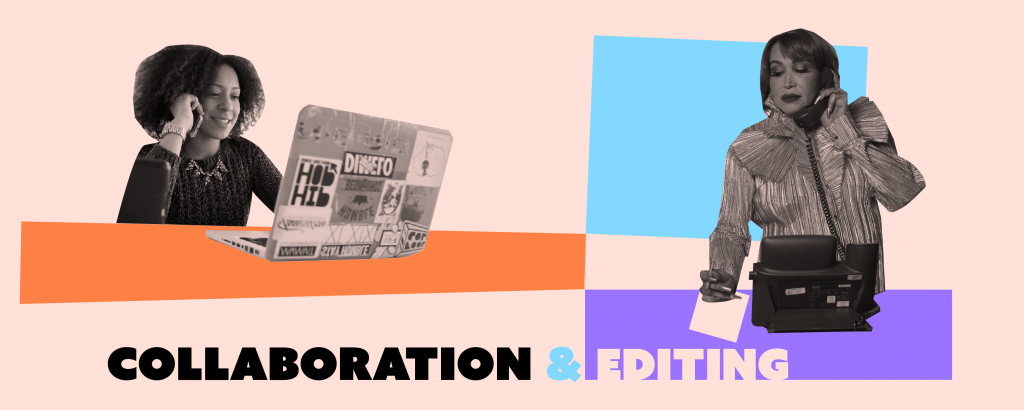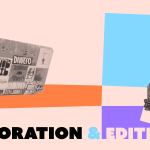
Let’s make the future of tech about ‘us’ not ‘them’
By Megan Lucero
Collaboration is the new buzz word these days – and rightly so. As public services are cut, public spaces disappear and the sources of, and access to, information changes, we are evolving in response. We are rightly stepping away from competitive workflows – ones that are wasteful and ineffective – and instead are sharing tools, work and processes. And thankfully, technology has been hugely influential in this space.
In the last few years, we have seen increased use of communication platforms like Slack, Keybase and Signal; video-conferencing ones like Zoom, Skype and Google Hangouts; Google Drive and Dropbox for file-sharing; Trello and the like for project management; and engagement platforms such as Loomio.
Now, more than ever, we have greater opportunities to work together instead of apart. So why is it still so difficult?
They have all provided means to reduce duplication, connect with each other more easily, and speed up processes and outputs. Now, more than ever, we have greater opportunities to work together instead of apart. So why is it still so difficult?
Here are three things I think we can do to challenge existing providers and help us decide what tools best serve us.
Tools need to collaborate
Ironically, there seems to be a lack of understanding among product makers (willful or not) in how their products are actually used for collaboration. They are often great tools for the specific functions for which they’re built; but most people don’t use these platforms and products in isolation. They’re often using a mix of those I’ve outlined above.
Integration can and should be happening among a diverse set of companies and products – the answer is not to have a few companies dominating all integrated products, but many organizations providing diverse approaches.
We need platforms to speak to each other more – collaborate, one may say. Check out Slack Apps to see a positive example of how the platform provides a pipeline for users to integrate data, APIs, and the like. Also, integration can and should be happening among a diverse set of companies and products – the answer is not to have a few companies dominating all integrated products, but many organizations providing diverse approaches. Supporting diversification in a market will allow for a more creative and innovative space for growth.
When selecting tools for collaboration: think about how a tool works with others you are already using and make sure to support diversification.
Tackle fragmentation with participation
We need to move away from centralized knowledge control, and use people power and collaborative service design to better our public information.
While there has been great progress in the open data community, there is still a long way to go; especially when it comes to public interest information. As someone who has worked in the data journalism space for eight years, I can tell you that there is a shocking amount of information about councils, government practice and public life that remains in the dark due to the difficulty in accessing data, the fragmentation of it, or the fact that it is not collected in the first place. For example: before 2019, homeless deaths were not recorded by the UK government. Yet following a collaborative investigation by the Bureau of Investigative Journalism, reporters and active community members were able to build a rough public record, and those estimates led the Office of National Statistics to produce official statistics in December 2019. So hope is on the horizon. I’m inspired by projects like Galaxy Zoo from the University of Oxford; the Imperial War Museum’s ‘Operation War Diary’; the ‘LibCrowds’ project from the British Library; and the ‘Documenters’ project by City Bureau in Chicago.They all used crowdsourcing to solve problems and build assets that are publicly owned. Participants were a part of something, and learned about the public interest challenge, and in doing so, laid a great foundation for digital participation (which I’d love to see more platforms learn from). We need to move away from centralized knowledge control, and use people power and collaborative service design to better our public information.
When planning a collaboration: seek out organizations that value participation and knowledge sharing, and see how much you benefit from it.
Move past the screen
One final and key collaboration need is for technology to help us tackle physical barriers, in order to connect more deeply. The truth is, collaboration is hard. It relies on you and your collaborator having the same time and resources to collaborate; the drive, trust and means to do so; and most importantly, a clear understanding of the thing you are trying to achieve together. In this regard, digital tools only end up being as good as the relationships behind them. But our tech can do more to foster this. I’d love to see more tech that helps us connect positively with others – not least to tackle how tech has perpetuated digital bullying, hate speech, etc. At the moment, video-conferencing apps seem to be the simplest and most effective at addressing this. In response to the global COVID-19 crisis, organizations around the world began operating and connecting remotely, almost overnight. There is an undeniable connection and effectiveness to face-to-face conferencing in this way, and it has already transformed our connection with others by stepping past physical barriers. Will it continue and be built upon as we create a new ‘normal’ in the future? I hope so. I’d love to see more innovation in this space – in particular, how tech can add positive value. How can we connect more deeply? How can we build trust and positive communication? And most importantly, how can tools integrate and collaborate to be most effective?
When selecting tools for collaboration and connection: let’s find ones that are asking these questions and putting them at the heart of their product. Let’s also challenge ourselves to not just demand a more engaged and positive digital space, but build new working cultures to encourage the tech to rise to it.
The future may be uncertain but it is undeniable that the opportunity to build a cooperative and collaborative world through tech is possible. Tools that allow for integration, participation and deeper connection are crucial places to start.
The future may be uncertain but it is undeniable that the opportunity to build a cooperative and collaborative world through tech is possible. Tools that allow for integration, participation and deeper connection are crucial places to start. At the Bureau, we are facilitators of a people-powered network, aiming to set the news agenda and spark change from the ground up. The challenges I have listed are the ones we face in finding tools that are focused on public-level accessibility, collaboration and participation rather than ‘business needs’. As we seek to hear stories of those in our society that are underserved, hurt or ignored, and identify policies, power and decisions that can be challenged, where are the tools and tech that focus on entry level accessibility? That are geared toward building a shared resource for the public good? That allows us to harness and share information so we can better our lives and communities? That is the challenge ahead, and one worth fighting for.
Megan Lucero
Director of the Bureau Local
Megan Lucero (@Megan_Lucero) is Director of the Bureau Local, an award-winning newsroom and people-powered reporting network, which she launched in March 2017. It’s part of the Bureau of Investigative Journalism, the largest non-profit investigative news organization in the UK. The Bureau Local network is made up of more than 1,000 journalists, technologists and citizens from across the country, who work alongside the core team to investigate under-reported issues that matter to communities, and open up their findings and data to local reporters. The Bureau Local also co-publish with the Guardian, Channel 4 and the BBC. Before the Bureau, Megan was Data Editor at The Times and Sunday Times in London and broke stories such as the widespread blood doping in the Olympics, an award-winning investigation. She holds degrees from the University of California, Santa Barbara, and City University, London.

